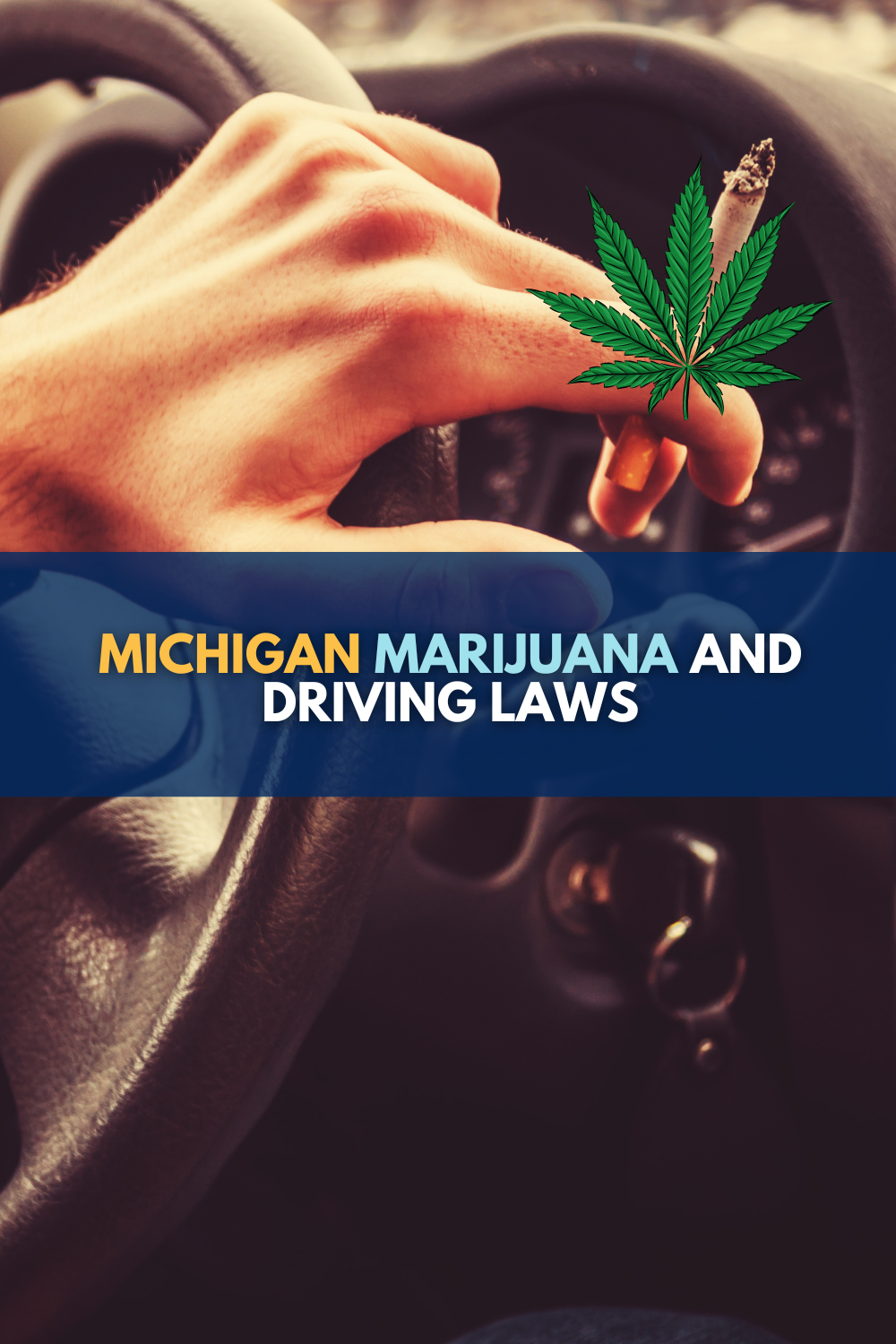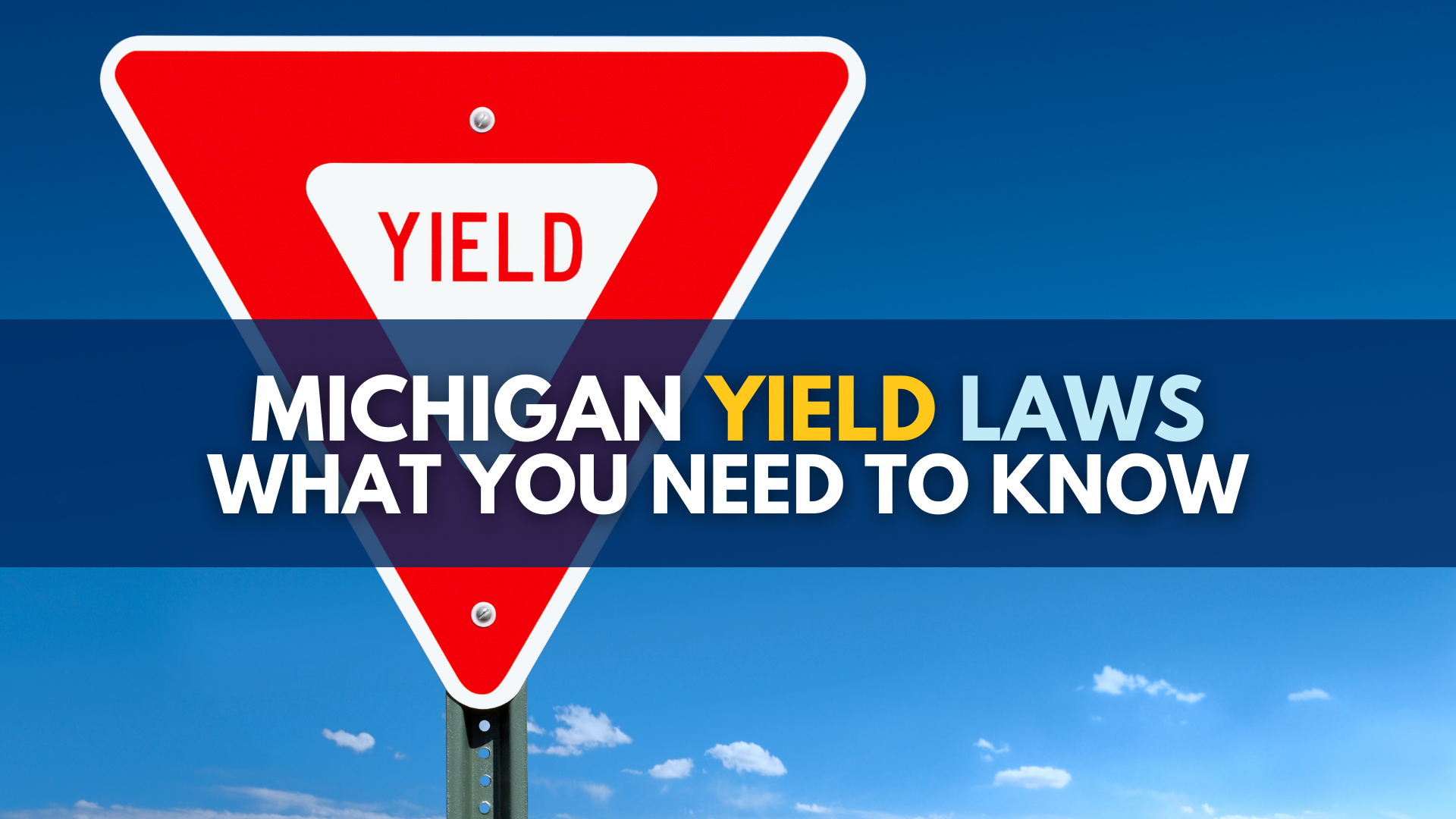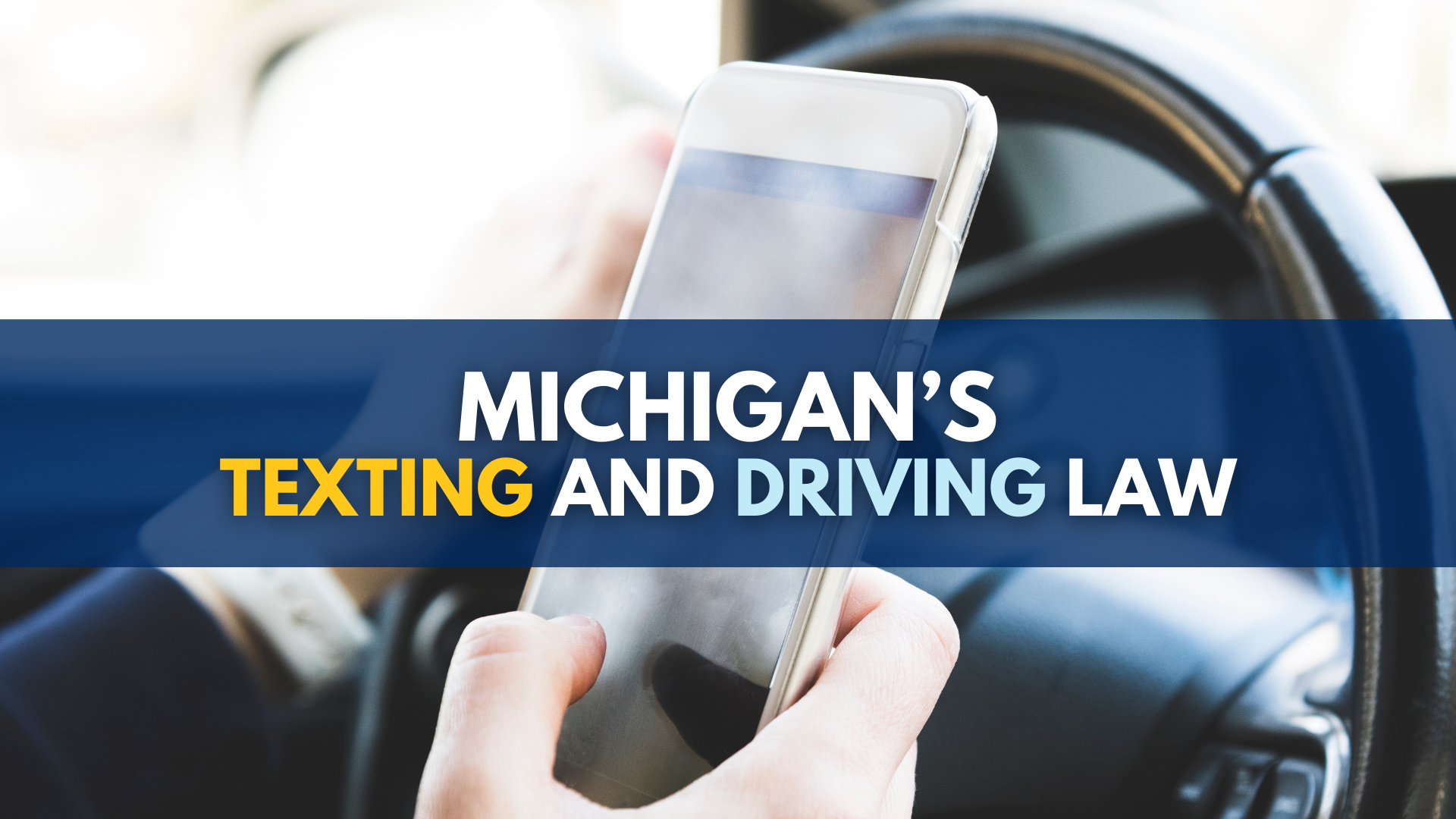
In Michigan, the marijuana and driving laws prohibit operating a vehicle under the influence, consuming while operating a vehicle, smoking in passenger compartment; unknown if exception to ‘any amount’ law for recreational marijuana
Today I want to review what drivers need to know about the marijuana and driving laws in Michigan.
Marijuana became officially legal in the state of Michigan on December 6, 2018, when the Michigan Regulation and Taxation of Marihuana Act legalized recreational possession and use of marijuana by people over 21 years of age. And 10 years before, on December 4, 2008, the Michigan Medical Marihuana Act legalized the use of medical marijuana.
There’s a lot we now know, but there is still a lot we don’t. I am writing this blog today based upon my own 25 years as an auto accident and auto law attorney, as well as work I’ve done on truck accident cases with other attorneys in states like Colorado where recreational marijuana was legalized in 2014. I’m also the past-chair of the Motor Vehicle Trial Lawyers Association and the current President of the Distracted Driving Litigation Group for the American Association for Justice. I’ve attended and presented at many legal seminars on motor vehicle accident litigation and distracted driving where the topic of marijuana and operating a vehicle in Michigan have been discussed.
Here are the cannabis laws in regards to operating a vehicle in Michigan that drivers must obey:
- People cannot operate a vehicle under the influence of marijuana
- People cannot consume marijuana while driving
- People cannot smoke marijuana inside the passenger compartment of a car or truck while it’s on a public road
What are the marijuana and driving laws in Michigan?
According to Michigan marijuana and driving laws, drivers cannot drive under the influence of marijuana, regardless of whether it was consumed on a recreational or medical basis. (MCL 333.27954(1)(a); 333.26427(b)(4))
How do the police know if you have violated the marijuana and driving laws in Michigan?
Because no marijuana-detecting breathalyzer is currently being used by law enforcement to identify marijuana-impaired drivers, the police rely on other circumstantial evidence to determine if a driver has violated the marijuana and driving laws in Michigan.
That determination takes into consideration, but is not limited to, the following factors:
- A driver’s performance on standardized or non-standardized field sobriety tests
- Observations and/or reports about how a driver was actually driving
- Observations of a driver’s physical condition
- Whether the driver and/or the passenger possess an odor of smoked marijuana
- Statements or admissions by the driver
- Statements or admissions by occupants of the driver’s vehicle
- Statements or admissions by witnesses
Significantly, if a suspected marijuana-impaired driver is required to take a chemical test to check his or her system for the presence of marijuana, there is no statutorily prescribed legal THC limit to prove that he or she is under the influence of marijuana.
Is it illegal to smoke weed and drive in a car in Michigan?
The Michigan Regulation and Taxation of Marihuana Act prohibits both consuming and smoking weed (recreational marijuana) while driving in car in Michigan.
Specifically, the marijuana and driving laws in Michigan provided by this act state:
- A driver is prohibited from “consuming [recreational] marihuana while operating, navigating, or being in physical control of any motor vehicle . . .” (MCL 333.27954(1)(g))
- A driver is prohibited from “smoking [recreational] marihuana within the passenger area of a vehicle upon a public way.” (MCL 333.27954(1)(g))
Notably, the Michigan Medical Marihuana Act does not specifically address whether a lawful, registered medical marijuana user can smoke medical marijuana while driving and/or within the passenger compartment of a vehicle that is being driven on a public roadway.
Is it illegal to smoke marijuana while driving in Michigan?
In Michigan, it is illegal to smoke marijuana while driving as the law prohibits drivers from “consuming” and/or “smoking” marijuana while they are driving on a Michigan roadway. In addition, passengers are prohibited from smoking marijuana within while it is being operated on “a public way.” (MCL 333.27954(1)(g))
Can you smoke weed in your car in Michigan?
No, you can’t smoke weed in your car in Michigan. The marijuana and driving laws under the Michigan Regulation and Taxation of Marihuana Act prohibit smoking weed (recreational marijuana) within the passenger area upon a public way. (MCL 333.27954(1)(g))
As for medical marijuana, it’s unclear because the law does not specifically address whether a person can smoke medical marijuana in the passenger area of a vehicle.
Can a passenger smoke weed in a car?
No a passenger can’t smoke weed in a car in Michigan. Recreational marijuana cannot be smoked by anyone within the passenger compartment of a vehicle. It is still unclear whether medical marijuana can be smoked.
Can I use medical marijuana and drive in Michigan?
Yes. The marijuana and driving laws in Michigan state that a lawful, registered medical marijuana user can use medical marijuana and drive in Michigan, but ONLY if he or she is not driving under the influence of medical marijuana.
A lawful, registered medical marijuana user can legally drive after having consumed medical marijuana. There would appear to be a conflict here as Michigan’s zero tolerance law generally prohibits people from driving with “any amount” of pot in their system. (MCL 257.625(8))
However, in 2013, the Michigan Supreme Court decided People v. Koon where the justices held unanimously that the “any amount” prohibition did not apply to lawful, registered medical marijuana users:
“The Michigan Medical Marihuana Act (MMMA) prohibits the prosecution of registered patients who internally possess marijuana, but the act does not protect registered patients who operate a vehicle while ‘under the influence’ of marijuana. The Michigan Vehicle Code prohibits a person from driving with any amount of a schedule 1 controlled substance, a list that includes marijuana, in his or her system. This case requires us to decide whether the MMMA’s protection supersedes the Michigan Vehicle Code’s prohibition and allows a registered patient to drive when he or she has indications of marijuana in his or her system but is not otherwise under the influence of marijuana. We conclude that it does.”
Do the marijuana and driving laws in Michigan have an exception to the zero tolerance rule for recreational pot?
Unfortunately the Michigan Regulation and Taxation of Marihuana Act do not specifically address this issue in the context of a driver’s consumption of recreational marijuana.
As such, we will have to wait to see how Michigan’s courts handle the issue when it inevitably arises.
It will be interesting because the MRTMA contains an “immunity” provision that is nearly identical to the one in the MMMA that the Michigan Supreme Court relied on in Koon to conclude that lawful, registered medical marijuana users were exempt from the zero tolerance rule that prohibits drivers from having “any amount” of marijuana in their systems.
The immunity provision in the MRTMA provides:
“[T]he following acts by a person 21 years of age or older are not unlawful, are not an offense, . . . are not grounds for arrest, prosecution, or penalty in any manner, are not grounds for search or inspection . . . possessing, using or consuming, internally possessing . . . 2.5 ounces or less of marijuana . . . .” (MCL 333.27955(1)(a))
The immunity provision in the MMMA provides:
“A qualifying patient who has been issued and possesses a registry identification card is not subject to arrest, prosecution, or penalty in any manner . . . for the medical use of marihuana in accordance with this act, provided that the qualifying patient possesses an amount of marihuana that does not exceed a combined total of 2.5 ounces of usable marihuana . . .” (MCL 333.26424(a))
Injured in a car accident where the at-fault driver was under the influence of marijuana? Call the attorneys at Michigan Auto Law
If you were injured in a car accident while the at-fault driver was under the influence of marijuana and have questions on your legal rights, injuries and losses, you can speak to an experienced attorney, toll free anytime 24/7 at (800) 968-1001 for a free consultation. You can also get help from an experienced accident attorney by visiting our contact page or you can use the chat feature on our website.




Thank you for writing this post!
Canadians flocking to food rescue apps to reduce grocery bills and waste
When Gillian Pulfer listed roasted sweet potato soup, Flank [url=https://charmingdate-fake-or-not.over-blog.com/]charmingdate review[/url] steak and chicken salad from a Toronto Pusateri’s Fine Foods for $10 last day, the offer was too good not to brag about.
for chowing down, She let her Instagram fans in on her secret: She found the haul on Too good to go. The app is one of many uniting deal seekers with restaurants and grocers eager to keep aging food that’s still fit for consumption out of the trash to acquire a small fee.
Users of apps like Too a-ok, Flashfood, Feedback and Olio say they have paid from $3 to $10 for prepared lunches or dinners, A week’s worth of fruits and vegetables, several loaves of bread, Pastry boxes together with, Entire pizza or cakes.
The savings often do a lot, Said Eric tribe, Flashfood’s chief bazaar officer.
“Over special occasions, We had a father who wrote in and thanked us because he’d been let go from his job due to COVID 19 and he used your money saved on Flashfood to buy stocking stuffers for his kids, Said tribe.
some app, utilized by supermarket conglomerate Loblaw Corp, Was started by Toronto business owner Josh Domingues in 2016, After his chef related threw out $4,000 of food following a catered event.
The app offers generate, various meats, angling, loaves of bread, Dairy and pantry staples nearing their best before date and often marked down by at least 50 per cent. Some items are weeks, If banned or cooked. Others have a day or two left.
Orders are retrieved in housewares stores, Which typically mark items nearing the most beautiful before dates down or donate them to charities, Food banks and farming for animal feed.
But those methods still leave grocers accountable for a quarter of the country’s food waste, So Flashfood targeted that portion just, Said indigneous group. (The app does not divert food from non profit organizations, He excess.)
dating, Flashfood has kept greater than 13.5 million kilograms of food out of landfills and saved users a group $90 million.
in contrast, Second collect, A charity redistributing unsold items to the people in need, assessments that almost 60 per cent or 35.5 million tonnes of food produced in Canada is wasted annually. About 32 % or 11.2 million tonnes of that lost food is edible and could be sent straight to people in need.
“numerous people claim this food waste can be solved by downloading an app, Said helen Corradini, The Arrell Chair in Food Quality at the higher education of Guelph.
“That’s not likely true, but of course they can have a contribution to reducing this burden,
She believes better inventory planning and use of artificial cleverness would go even further to addressing food waste.
Too Good To Go’s country manager for Canada agrees inventory direction is key, But had said, “Matching demand and supply is very complex” And no restaurant wants to produce less realize it can’t serve late customers.
Too Good To Go mostly deals with dining places, Bakeries, and / or butchers, But also partners with grocery and convenience stores.
consumers that use app, that wasthat’s founded in Copenhagen in 2016 and expanded to Canada last July, Order ahead before fetching items at notable times.
What they pick up is a mystery because business concerns sell “question bags, And while others offer hints about their contents, other buyers don’t.
for example, Italian food purveyor Eataly advertises some $8 bags as having charcuterie items, But McEwan things to eat, Celebrity chef Mark McEwan’s supermarket, futures no clues about its $8 bags.
Toronto bakery Daan Go Cake Lab’s bags have featured cake slices or its famous attitude macarons. Some simply weren’t sold on that day, But others have cracks or blemishes the bakery’s posh customer wouldn’t accept.
Signing up for Too Good To Go was a simple choice, Said chief functioning officer James Canedo.
“As some chefs, You never want to see food wasted. It’s almost almost holy for us, he explained.
“So many individuals don’t have the same privileges, So for food to be burned, That is a thing we’re trying to prevent,
Corradini lauds those statements and said the apps’ waste reduction goals are noble, But there exist risks.
while some apps only deal with reputable vendors staffed with employees trained in handling food, Others like Olio allow anyone to put together food at home or sell items they can’t finish.
“I would never go for something that has been opened because discussion what went on there, Corradini understood.
She added that even food from grocers and eaterys should be examined closely before eating and customers should cook, freeze out, Prepare or consume anything they buy that is due to go off soon instantly.